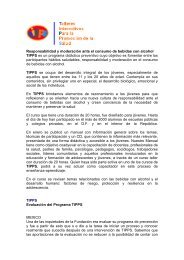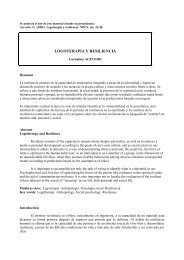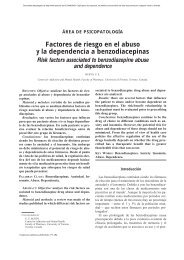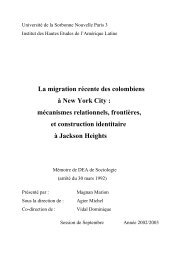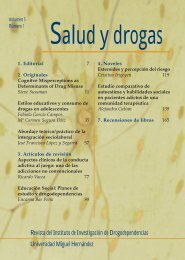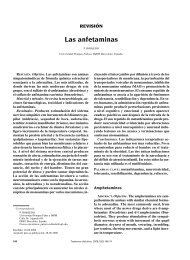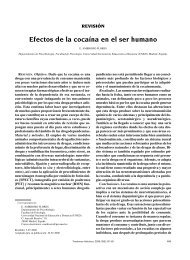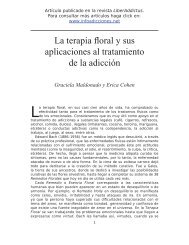migrant women in the United Arab Emirates
migrant women in the United Arab Emirates
migrant women in the United Arab Emirates
Create successful ePaper yourself
Turn your PDF publications into a flip-book with our unique Google optimized e-Paper software.
emphasizes <strong>the</strong>ir <strong>in</strong>tegral part <strong>in</strong> <strong>the</strong> nation’s development or, fur<strong>the</strong>rmore, puts <strong>the</strong>ir own<br />
lives at <strong>the</strong> centre of <strong>the</strong> study. Issues addressed <strong>in</strong> <strong>the</strong>se studies <strong>in</strong>clude <strong>the</strong> negative<br />
impact on <strong>United</strong> <strong>Arab</strong> <strong>Emirates</strong> children, language of children, values of children,<br />
defected socialization of children, ill-treatment of children, abuse of Islamic norms and<br />
values, health hazards, etc. (Khalifa 1986; Khalaf et al. 1987; Al-Khalfan Hanan 1985;<br />
Abd-Al-Jawad Issam 1985; M<strong>in</strong>istry of Work and Social Affairs 1990; and Al-Jirdawi<br />
1990).<br />
The above studies go <strong>in</strong>to detailed descriptions of how foreign nannies negatively<br />
affect <strong>the</strong> children of nationals. Most of <strong>the</strong>m place <strong>the</strong> ma<strong>in</strong> responsibility for this problem<br />
on <strong>the</strong> mo<strong>the</strong>rs <strong>the</strong>mselves, portray<strong>in</strong>g <strong>United</strong> <strong>Arab</strong> <strong>Emirates</strong> <strong>women</strong> as careless and<br />
superficial <strong>in</strong> <strong>the</strong>ir preference for a luxurious life over <strong>the</strong> well be<strong>in</strong>g of <strong>the</strong>ir children.<br />
Police studies are <strong>the</strong> most rigid of all on foreign female domestic worker. They base <strong>the</strong>ir<br />
conclusions on studies of foreign female domestic worker crim<strong>in</strong>als and <strong>United</strong> <strong>Arab</strong><br />
<strong>Emirates</strong> <strong>women</strong>'s perception of foreign female domestic worker crimes. Their statistics<br />
show that most crimes committed by foreign female domestic workers <strong>in</strong> Dubai dur<strong>in</strong>g<br />
1991–92 are related to adultery (up to 50 per cent). The second highest crime reported was<br />
<strong>the</strong>ft (30 per cent). The third is <strong>the</strong> violation of immigration laws (10 per cent), and <strong>the</strong> rest<br />
are less representative, for example, murder (Najib et al. 1993).<br />
A more critical approach to <strong>the</strong> treatment of <strong>the</strong> foreign female domestic worker <strong>in</strong><br />
<strong>the</strong> <strong>United</strong> <strong>Arab</strong> <strong>Emirates</strong> household is pronounced among some <strong>United</strong> <strong>Arab</strong> <strong>Emirates</strong><br />
<strong>in</strong>tellectuals and Government officials. Said B<strong>in</strong> Bellelah, <strong>the</strong> General Director to <strong>the</strong><br />
Dubai Migration office states: “<strong>United</strong> <strong>Arab</strong> <strong>Emirates</strong> society suffers from <strong>the</strong> degrad<strong>in</strong>g<br />
perception of <strong>the</strong> foreign female domestic worker. This negative perception is caus<strong>in</strong>g<br />
major problems <strong>in</strong> <strong>the</strong> relationship between <strong>the</strong> foreign female domestic worker and her<br />
sponsors. This wrong perception is also recreated along <strong>the</strong> new generation and <strong>United</strong><br />
<strong>Arab</strong> <strong>Emirates</strong> children mistreat <strong>the</strong> foreign female domestic worker” (Kul Al Usra, March<br />
2001). Ano<strong>the</strong>r <strong>United</strong> <strong>Arab</strong> <strong>Emirates</strong> prom<strong>in</strong>ent figure says: “This society is recreat<strong>in</strong>g<br />
generations of dependent personalities who request that domestics do everyth<strong>in</strong>g for <strong>the</strong>m.<br />
Our full reliance on domestics <strong>in</strong> <strong>the</strong> household is encourag<strong>in</strong>g <strong>the</strong> growth of an<br />
unproductive family” (Kul Al Usra, 2001).<br />
In short, foreign female domestic workers <strong>in</strong> <strong>the</strong> <strong>United</strong> <strong>Arab</strong> <strong>Emirates</strong> have <strong>the</strong>ir own<br />
problems, brought with <strong>the</strong>m <strong>in</strong> <strong>the</strong> migration process. These problems, however, are<br />
aggravated and mishandled on all levels <strong>in</strong>side <strong>the</strong> <strong>United</strong> <strong>Arab</strong> <strong>Emirates</strong>. Who is<br />
responsible? Who is to blame? Is it national poverty? Is it <strong>in</strong>ternational poverty? Is it <strong>the</strong><br />
<strong>United</strong> <strong>Arab</strong> <strong>Emirates</strong>’ social context? Is it <strong>the</strong> <strong>United</strong> <strong>Arab</strong> <strong>Emirates</strong>’ laws of migration<br />
and its foreign labour regulations? Is it <strong>the</strong> <strong>in</strong>dividual employers? Is it <strong>the</strong> foreign female<br />
domestic workers and <strong>the</strong>ir lack of knowledge and experience of <strong>the</strong> <strong>United</strong> <strong>Arab</strong> <strong>Emirates</strong><br />
society? The situation is highly complicated and it is not easy to uncover all <strong>the</strong> facts. This<br />
report, however, addresses <strong>the</strong> issue from <strong>the</strong> foreign female domestic worker’s own<br />
perspective given work conditions, life as expatriates, uprooted from <strong>the</strong>ir country and<br />
family.<br />
2.2. Traffick<strong>in</strong>g<br />
Traffick<strong>in</strong>g is generally understood as br<strong>in</strong>g<strong>in</strong>g <strong>in</strong> illegal persons to be exploited and<br />
pushed to work <strong>in</strong> illegal situations, such as prostitution or o<strong>the</strong>r illegal [nationally or<br />
<strong>in</strong>ternationally] forms. It is not an acceptable practice <strong>in</strong> <strong>the</strong> <strong>United</strong> <strong>Arab</strong> <strong>Emirates</strong> and <strong>the</strong><br />
Government works hard to seal its borders and ports to traffick<strong>in</strong>g. Access<strong>in</strong>g reports and<br />
<strong>in</strong>formation on traffick<strong>in</strong>g is difficult, however, one would suspect that traffick<strong>in</strong>g does<br />
exist <strong>in</strong> limited forms, especially s<strong>in</strong>ce entrance to <strong>United</strong> <strong>Arab</strong> <strong>Emirates</strong> on a visit visa is<br />
easy and accessible even at travel agencies or hotels.<br />
UAE Work<strong>in</strong>g Paper_1 13



